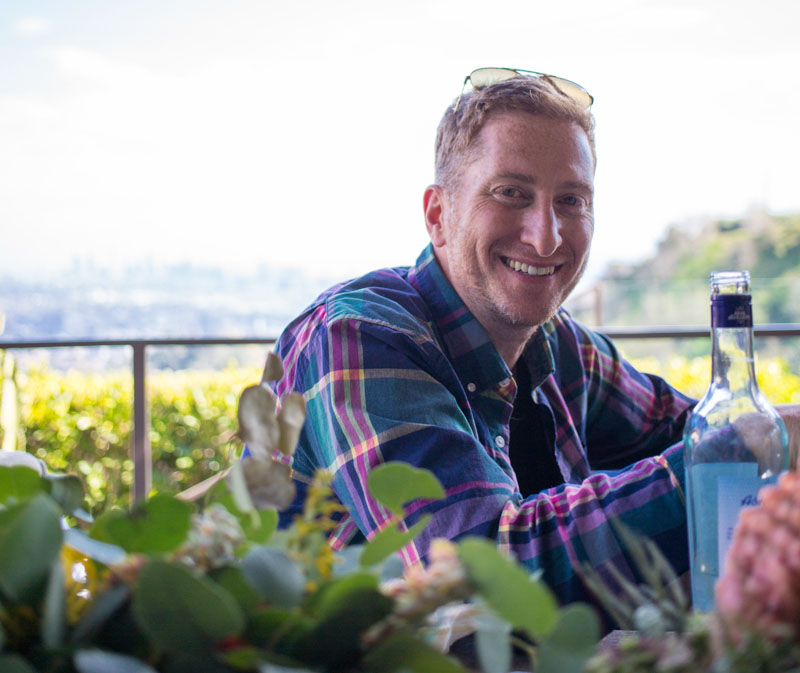 Guy Shalem at the Meeting of the Masters in March 2024. (Photo credit: Charlotte Acevedo).
Guy Shalem at the Meeting of the Masters in March 2024. (Photo credit: Charlotte Acevedo). Ever get invited to something and not really have much of an idea of what to expect? That’s what I experienced when filmmaker/chef Guy Shalem invited me to attend his Meeting of the Masters (MOTM) brunch on March 17. I was invited less than 48 hours in advance and told, “Come at 9:30 am. Dress how you want; it’s Los Angeles.”
All I knew is that the volunteer kitchen staff would arrive at 9:00 a.m. and that guests (many of them involved in the entertainment industry) would arrive at noon. I was sent photos from the last event he hosted and screenshots of the WhatsApp group he used to coordinate preparations. The food looked divine. And this Shalem guy sounded mighty proud of the meals he created four weeks ago.
This was all part of a dining club that dates back half a decade, with a pandemic-induced dip in the middle. This rebooted iteration of the MOTM would be at entrepreneur Lee Trink’s home in the Hollywood Hills.
Entering Trink’s home at 9:30 am on Sunday morning, the first person I see is Shalem, wearing a Factor’s Deli sweatshirt, alongside nine other people hard at work around the kitchen island. They all clearly came dressed knowing that they’d be helping to prep food for a hundred people. The event photographer, Charlotte Acevedo, arrived mere moments afterward and said what I was trying to find the words for: walking into Trink’s house felt like being hit with “an aural flavor bomb.”
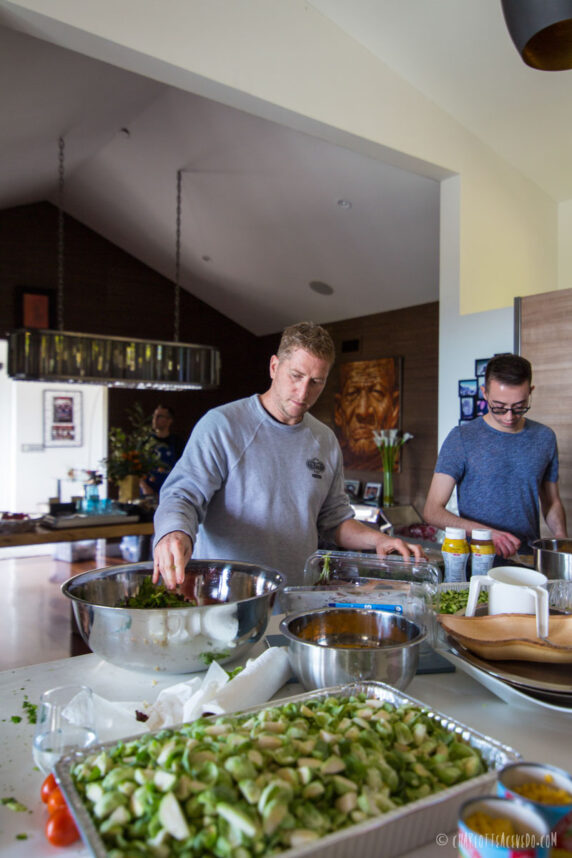
It was St. Patrick’s Day, and many (but not all) of the guests would be Jewish, especially because the event was a benefit for an Israel Defense Forces veterans charity. Shalem planned the MOTM menu to be all-kosher, all-organic, and very visually green. Appetizers included baba ganoush, homemade hummus with mushroomsand lavash bread, with a gluten-free alternative available — because this is Los Angeles. The main course featured a St. Patrick’s Day-inspired broccoli, asparagus, and herb quiche. The shakshuka was piled 8 inches high. There was gluten-free matzah brei cake with applesauce and cream cheese, Israeli salad, garlic beets on a bed of tahini and tamarind, smoked salmon with cream cheese, crispy garlic rosemary potatoes, roasted brussels sprouts, and candy-spiced yams.
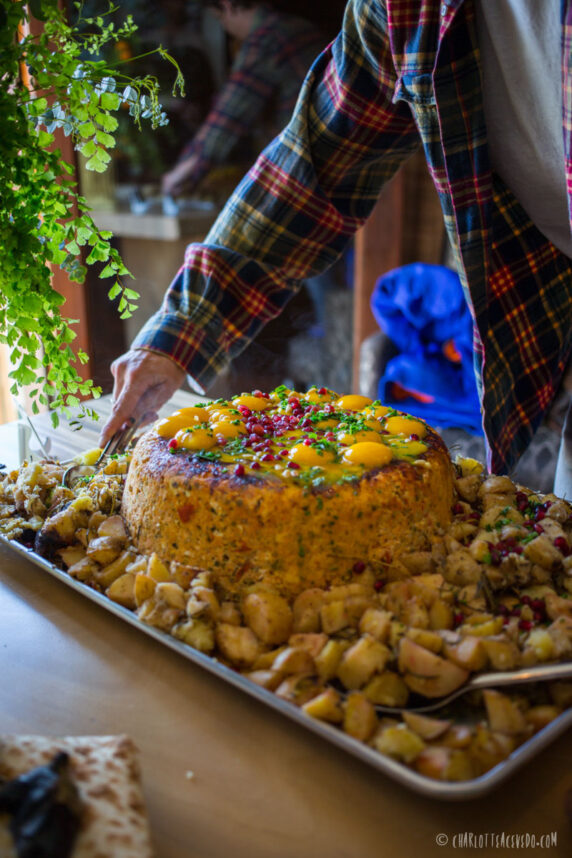
Talking with the volunteers in the kitchen, I was keenly aware that I still didn’t know much about Shalem. But a common characterization I heard from his guests is that he’s a multihyphenate artist and he has a real passion for food and putting people together — and every possible trait and talent you’d want in a party host.
Intimate gatherings like the MOTM brunch are far from being a run-of-the-mill networking affair. It’s a confluence of creativity, culinary art, and community. The kitchen volunteers come from all across a wide spectrum of the entertainment industry. They’re chopping up what looks like the entire green section of a supermarket.
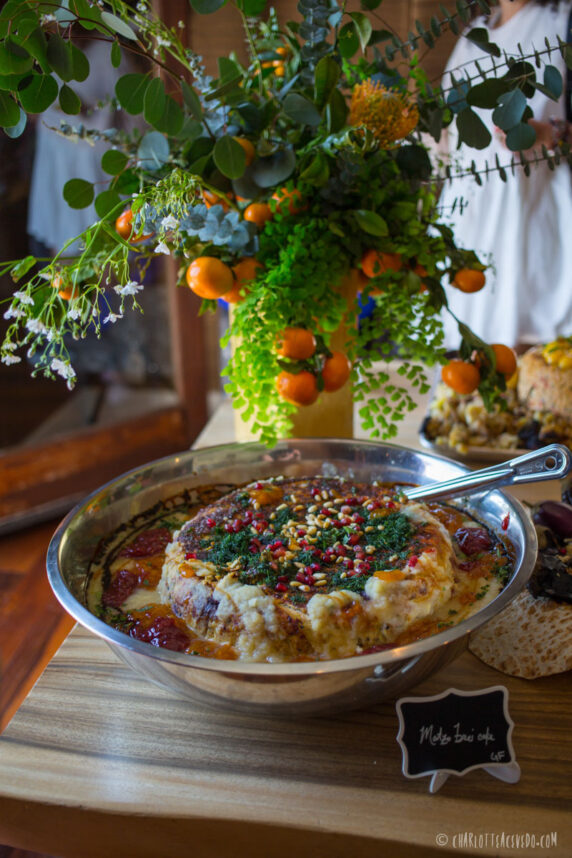
“Meeting of the Masters” sounds like some sort of overpriced self-help seminar. It’s not. It’s a gathering of primarily entertainment industry professionals, eating and connecting — but not glad-handing and exchanging business cards and hunting for seed funders. The attendees are really connecting. It’s not a “see and be seen” gathering. It’s not a fundraiser where the biggest donors are listed and ranked and pampered.
Officially, the club’s website describes MOTM as a “collection of producers, advocates, storytellers and designers of homes, meals and great conversations.” Anyone can submit a request for an invite on the club’s website. The cost per attendee varies from $125-$245. The invite asks for three things: Explain how you heard about MOTM, describe yourself in three words or more, and a social media link.
In 2019, The Hollywood Reporter wrote that “at one of Guy Shalem’s Meeting of the Masters dinners, a soccer pro might be seated next to a real estate agent who might be seated next to one of Hollywood’s top execs.”
Sure there’s people there who had a verified checkmark on X long before anyone with $8 per-month could get them (back when it was still called “Twitter”). That’s not the reason you show up at a MOTM. You walk into a MOTM event and everyone assumes you’re someone there looking to mingle, eat well and exchange ideas. There’s an implicit understanding that 24 hours later, everyone in attendance will be up to their ears in their Monday morning work. Another thing about the attendees is that everyone seems to be passionate about what it is they do for living.

In the 2019 Hollywood Reporter article, Shalem spoke about his big dreams for MOTM. It was at a time when his small dinner gatherings of a dozen or so friends and associates was growing in size and prominence. In the span of the year, the MOTM events grew to become 100-person dinner bashes.
And then the COVID-19 pandemic happened. The events went underground in 2020 and 2021, with Shalem secretly hosting a few to avoid running afoul of Los Angeles County safety measures.
For the next two years, MOTM went dormant, while Shalem split his time working in Los Angeles and abroad.
But when the terror attacks of Oct. 7 unfolded in his homeland of Israel, he was encouraged to reboot MOTM. He credits his friend Jon Murray (executive producer “Keeping Up with the Kardashians,” “Project Runway” and “The Real World”) for encouraging him to keep the MOTM seed alive. Others started encouraging Shalem too. So MOTM would return, this time, he’d collaborate with groups fighting antisemitism, expanding MOTM’s purpose and reach.
10:00 AM – Two Hours Until Doors Open.
Taking time from coordinating the kitchen operations, Shalem stepped out to the patio overlooking the Los Angeles basin to see how flower preparations were going.
“It’s like directing a film, there’s not much difference,” Shalem told the Journal. In seven hours, Shalem would leave the party to direct a documentary at The Viper Room with a crew of 10 people. He’s one of those people who brings out the abilities in others. He’s nothing like the chefs on reality cooking shows. He’ll explain the mechanics and tactics succinctly and respectfully, not even by chef standards.
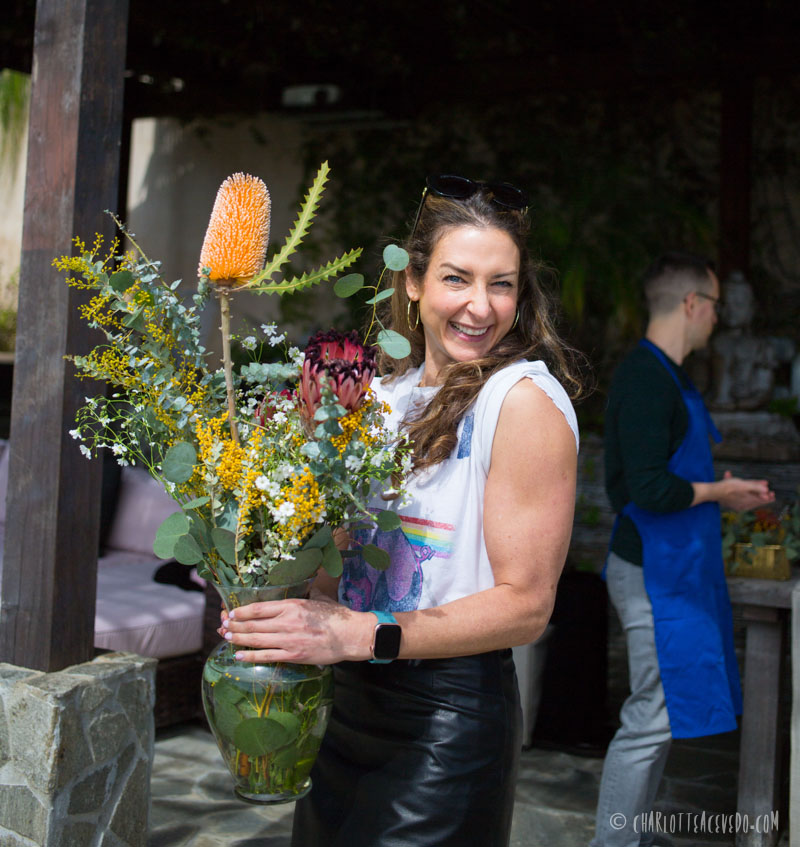
Actor and filmmaker Ari Frenkel was standing over what looked like a bowl of 64 raw eggs. It was one stage in a recipe for a massive shakshuka. I recognized Frenkel from the viral satire series he made in 2023 about antisemitism, vaguely titled, “The Jews.” He was at the previous MOTM in February.
“Guy invited me because he knows that I’ll do everything in the kitchen without complaining,” Frenkel told the Journal. “It’s connected me to all these amazing Jews and Israelis within the entertainment industry. I keep finding myself meeting these amazing new people, and we all have a collective mission to create community and to create new art that brings Jewish joy and positivity to the moment, which I think we all need.”
On another side of the kitchen island was Aliza J. Sokolow, author of the book “This Is What I Eat: Fun Activities for Mindful Eating.” Wearing a white apron, she asked her fellow sous chefs, “does someone want to take pomegranate duty?” Next to Sokolow was writer and producer Cory Brusseau. He had been to about a dozen MOTM events since 2019
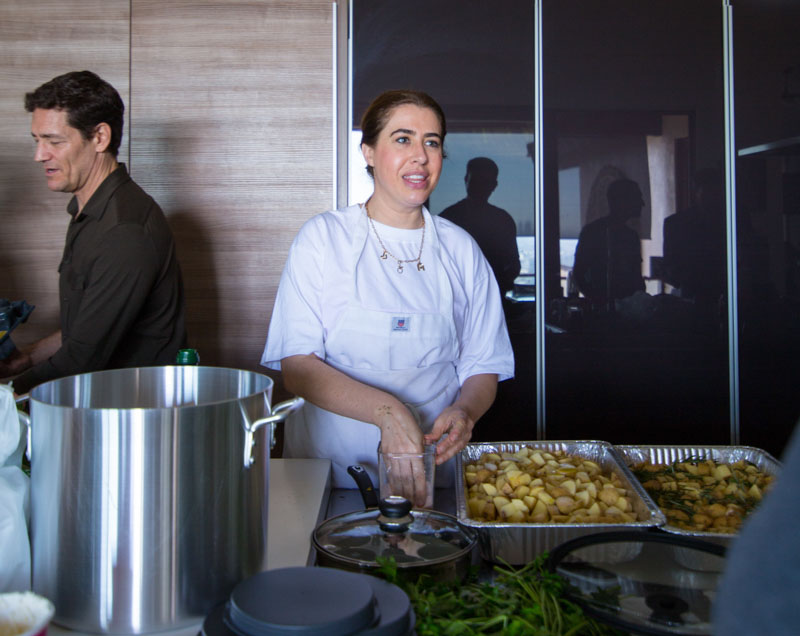
“The core group has gotten bigger and you do see a lot of the same faces, but sometimes they’re on another side of the table, and sometimes they’re in the kitchen cooking for their fellow guests, which is really cool,” Brusseau told the Journal.
If feels a bit like a kibbutz. Part of attending regularly is eventually helping out every now and then in the kitchen. When Brusseau attended the original MOTM events, one of the draws was that the event “was going to force you out of your comfort zone to hang out with people that you’ve never met and will be outside of your normal purview.” One of the people Brusseau has kept in touch with over the years was Mileen Patel. While slicing radishes, Patel explained that he hasn’t been to a MOTM in five years, but fondly remembered his first MOTM.
“It was about 40 people, so the perfect amount of people to feel like it was a good group, but not feel overwhelmed that you couldn’t get to talk to people,” Patel told the Journal. “That whole night was one of the first experiences in a long time where I never thought about taking my phone.”
Patel and Brusseau spent a large part of their Saturday prepping banana bread. (Author’s note: it was the best banana bread I have ever had). Out back at the fire pit, five people were cutting flowers and picking oranges off a tree. One guy was wearing a Warner Brothers Studios apron. So Hollywood.
12:00 PM – Doors Open.
The coffee and smoothie bar line grew by the minute. The specialty drink for the day was an organic lime and orange mimosa, blending Italian Prosecco with kosher moscato. One of the first non-kitchen-duty guests to walk in to the party was the primary financial sponsor of this particular MOTM, real estate broker Jeff Luster. It was Luster’s second time at MOTM and he was thrilled to be back. Last time, he was part of the volunteer kitchen team, chopping brussels sprouts and picking dill off the stem.
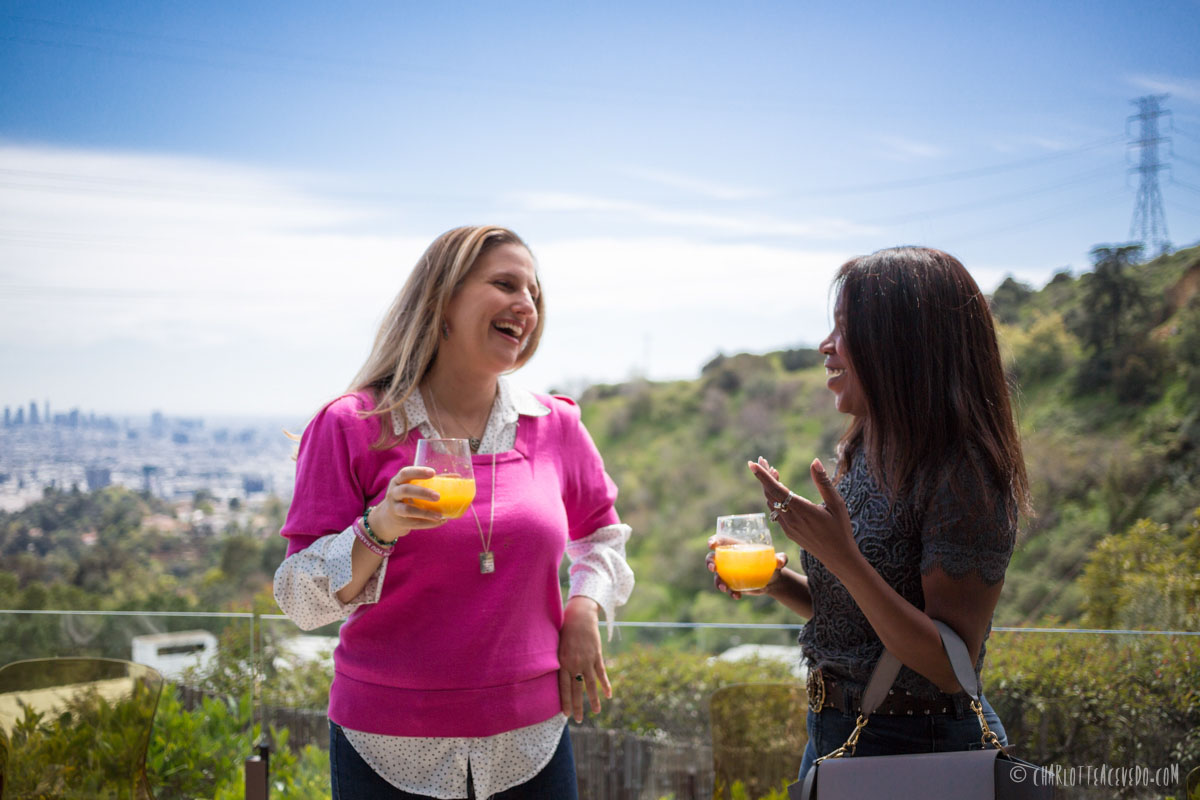
Guy’s credo is “‘leave your ego at the door, come and have a good time,’” Luster told the Journal. “It’s really important to him to pay it forward. He feels very blessed. He really feels people’s need to help others.” Little does Luster know that in about two hours, as dessert would be served, all of the attendees would sing happy birthday to him. The cake would be one of the very few non-in-house-made items served that day.
Charlotte Acevedo, who took the photographs that accompany this story, said that MOTM is “definitely a nurturing spot for creative minded people, but also people who are innovative and want to see the betterment of humanity.” Rob Leonard, a Seattle-based industrial designer, stood by while holding a ten of diamonds playing card. It was part of an ongoing ice breaker at the party. Guests were each handed a playing card and were told to find whoever has their opposite suit playing card and strike up a conversation.
“I made some great connections, surprisingly, around my art,” Leonard told the Journal. The last time Lenoard came to an MOTM event, one of his art pieces sold and is now hanging in a Hollywood home. “I think there’s a great pride in having the opportunity to come and then there’s a great humility in the way Guy runs it, which is to ‘please, volunteer.’ And I think that rhythm of pride and humility is a good one.”
Writer and producer Ron Rappaport told the Journal that he always enjoys MOTM gatherings because they’re a “reliable community of like-minded individuals” freely- exchanging ideas.
1:30 PM – Lone Soldiers
While final food preparations were being made in the kitchen, everyone else went outside under a vine-covered awning.
Shalem took a moment to welcome everyone, but also made sure to commend every single one of the kitchen volunteers by name.
“Make sure you talk to as many people as you can, not just people you came here with,” Shalem said, welcoming the attendees gathered underneath an ivy awning. “And what else? Have fun! All of the volunteers are amazing. And the only way for this to happen is to keep this word of mouth, and next time all of you need to come back and volunteer.”
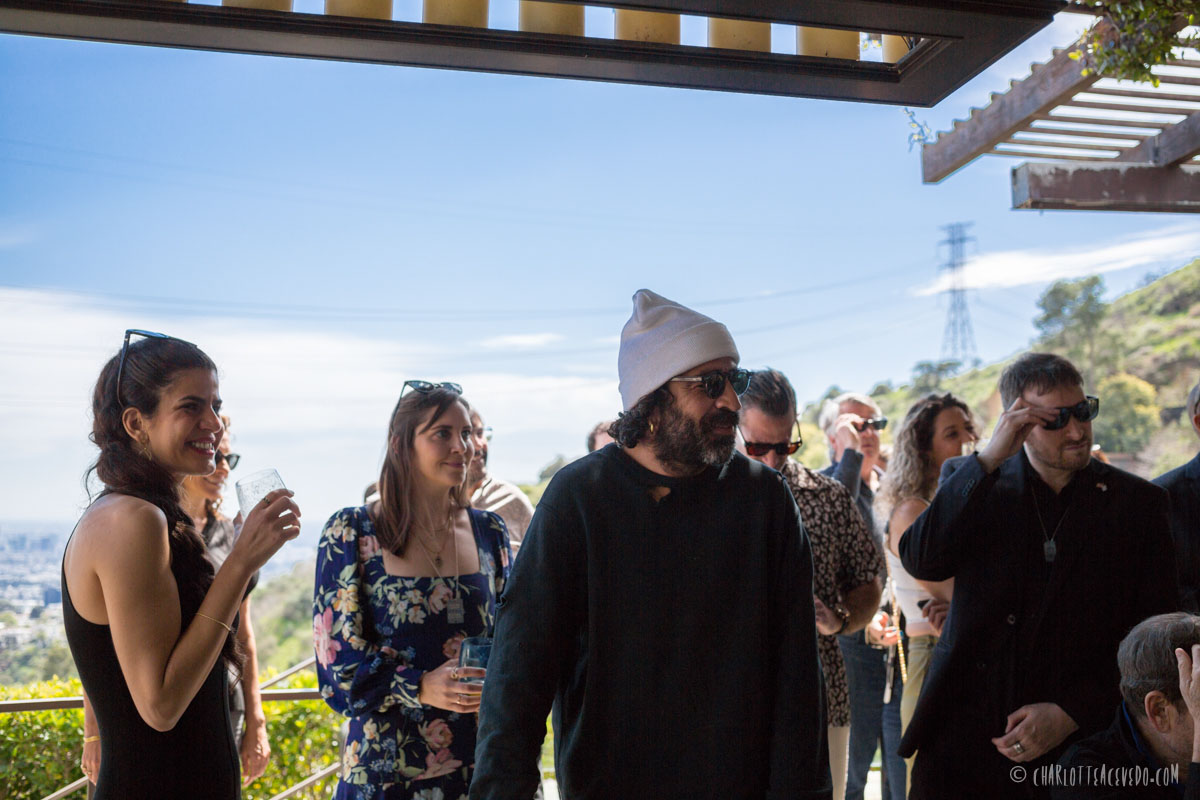
Before the charity of the day was presented, one of the attendees spoke of a particular WhatsApp chat they run, filled with hundreds of Israel-focused advocates in Los Angeles. It began on Oct. 8, 2023 as a group of 12 people, and has now grown to over 500 concerned Israel advocates in the entertainment industry. They support pro-Israel charities and mobilize action to their social media followers for combatting antisemitism in entertainment and beyond.
The next speaker, David Devor, leads a charity benefiting from this particular gathering. The charity, Nevut (Hebrew for “to navigate”), is a support system for “lone soldiers” in the IDF. A “lone soldier” is a volunteer who comes from outside of Israel to serve in the IDF. Devor is not only Nevut’s chairman of the board, he is also the parent of an IDF soldier who enlisted nine years ago. Devor flew in from New York to Los Angeles just for this moment. He spoke about how after the lone soldiers serve, some may stay in Israel for a few years, but about 40% eventually leave Israel and return to their home country. That’s when the “lone” in lone soldier starts to metastasize. Devor spoke about the perils of returning from war without fellow veterans nearby.
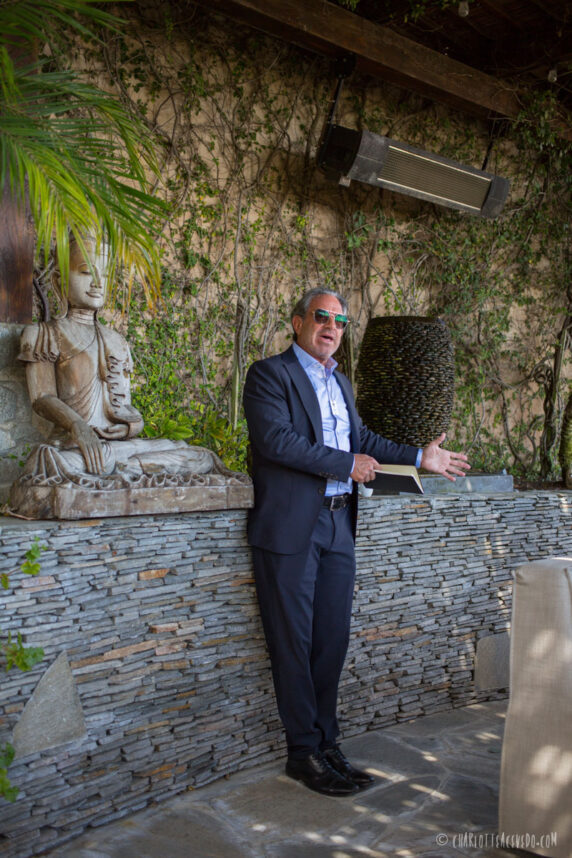
“There’s nothing here, there’s no camaraderie, you’re not a U.S. veteran, so you have nothing from the V.A.,” Devor said. “The problems that these guys are dealing with are problems you can only imagine. The reality is our plate is going to be full as these guys are coming back from Israel. Some have come back, and some have gone back already.”
Nevut aims to help IDF veterans transition back to civilian life in their respective homelands. They coordinate retreats for veterans and their families, provide supplies, and connect them with therapists and check-in buddies. Devor then asked for other IDF veterans to raise their hand and be recognized. There were at least four who raised their hands. One former soldier spoke about how she lost her best friend on Oct. 7 and how being connected by Nevut with other veterans helped in the healing process. Another IDF veteran told the crowd that “fighting for the IDF in Gaza is nothing like ‘Black Hawk Down’ and other Hollywood war movies.” In a crowd of entertainment professionals, there was an audible shift in the body language and tone of many of those captivated by the IDF veterans’ brief remarks. The veteran then brandished the active duty dog tags he wears every day.
For the next hour-and-a-half, the attendees went off to sit and eat and get to know one-another.
The views of the entire Los Angeles Basin were stunning, with three levels of sunny patio space, balconies in the shade — all with a view from downtown to the ocean. For a fleeting afternoon, the overwhelming vast expanse of Los Angeles felt a little bit smaller. There were plenty of drinks but nobody was drunk. There was a massive terrace but nobody was smoking. At the table where most of the food was being served, attendees filled their plates and gave unsolicited (but quite welcome) recommendations of what to eat next. By 3:00 pm, every few minutes, someone would break away from their conversations to go back for seconds, thirds and fourths of food. By dessert time, even after the food had been scooped and sliced by MOTM attendees, it still somehow looked beautiful and picturesque.
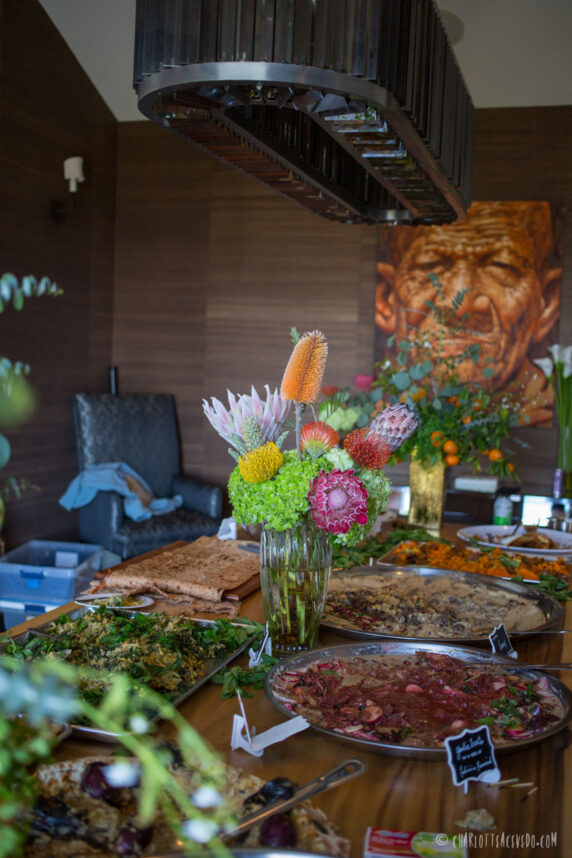
3:30 pm: Reflections
For dessert, guests enjoyed homemade banana bread and seasonal berries on a bed of whipped cream, drizzled with brandy honey mint chia seeds, rounding off the meal with a sweet finish. There was plenty of the aforementioned banana bread — perhaps the 80 guests eating 200 people’s worth of food were starting to feel a little full. Shalem beckoned Luster to come back in the house from the balcony. He was greeted by everyone singing “Happy Birthday.”
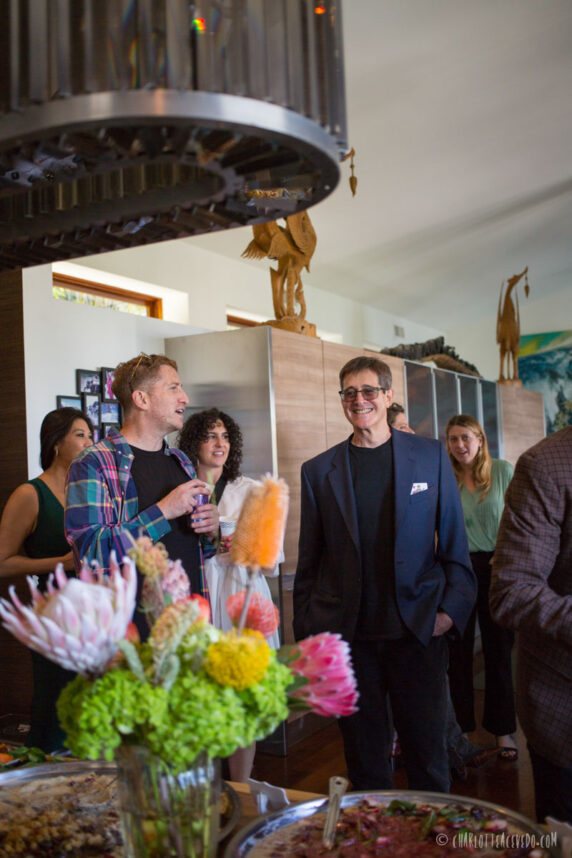
As the clatter of plates and silverware slowed down (except for in the kitchen where a dishwashing crew of three was hard at work), guests were apt to reflect on how much fun the day had been. Actor Adam Tsekhman, invited by fellow actor Frenkel, offered his perspectives.
“There’s a lot of mutual affection between the people, maybe it’s because of the [Nevut] cause,” Tsekhman told the Journal. “The food stands out because it’s incredible. I love the fact that we were helping to make the food, chop the food, stir the food. I got to reconnect with people that I’ve actually known for a long time and haven’t seen for a while. And there’s a lot of smart people, a lot of dedicated people, a lot of aware people here, so I like it.”
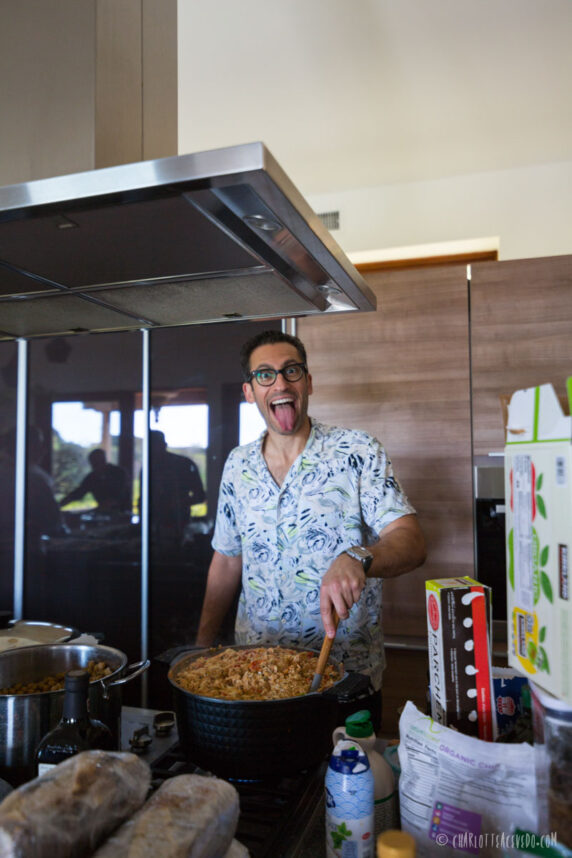
Actress Amanda Markowitz reflected on how this event epitomized the sense of community she continues to feel in the wake of the attacks of Oct. 7.
“I have made such a beautiful community of friends that I never knew before,” Markowitz told the Journal. “I have my before life, and then my after life, and that’s my silver lining. Something like [MOTM] really highlights that it’s for all of us to come together in a shared experience.”
Lee Trink spoke about what sets this party apart from other events he’s hosted in his home.
“It’s community based — you eat one time and you work the next time, so there’s a virtuous cycle of participating one way or another,” Trink told the Journal. “That’s a cool idea, and I think that Guy puts together an incredible spread and great crowd of people.”
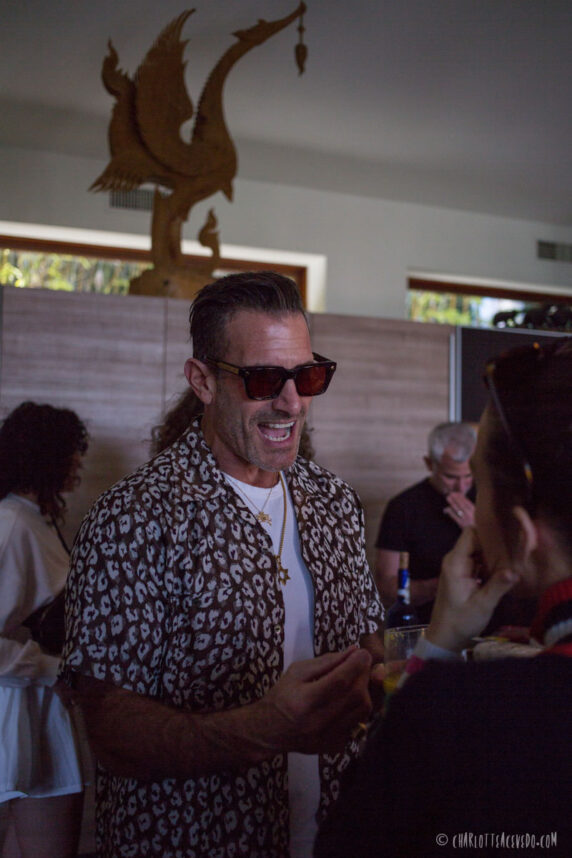
4:30 pm: Finally, a Moment with Guy Shalem
As the dishwashing continued, but before he went to his next event of the day, Shalem sat to really introduce himself to the Journal. He’s affable. He’s what you want in a host. He also has an uncanny resemblance to actor Billy Zabka from “The Karate Kid” and “Cobra Kai.” Shalem is the kind of person who flies in a private jet to work on film in Greece one day, and then takes the bus a few times a week back in L.A. to keep himself humble. He opened up a bit more about his background after revealing his own assessment of how he got his kitchen skills.
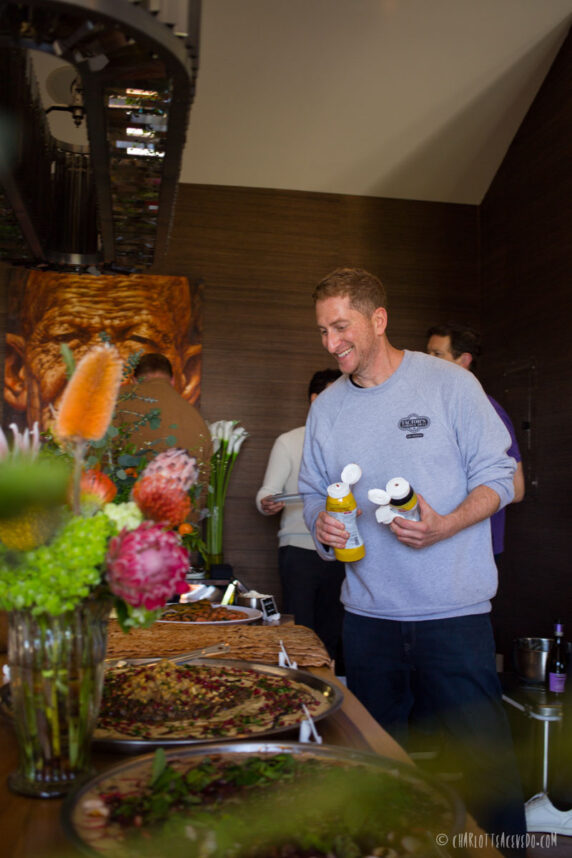
“No real culinary skills other than being self-taught, and picking up tips from watching chefs in the 108 countries I have visited around the world,” Shalem said. “Perhaps growing up with a mother who taught me how to be creative in the kitchen from a very young age was my real culinary education.”
Shalem was born in Israel to Toby (Tuvia) and Jeanette in 1973. Jeanette is an Egypt-born Jew and the youngest of 10 (where any family meal was a production). Her mother and grandmother come from a long line of talented chefs.
Shalem moved to California at age 18. In his over three decades in Los Angeles, he has written, directed and produced films, television, commercials, and music videos and was nominated for a Daytime Emmy in for the reality show, “Instant Beauty Pageant.” Shalem is also a “Burner,” attending Burning Man for the first time in 1998. He even brought his elderly parents to Burning Man in 2006, without fully explaining where they were going beforehand. In September 2015, Toby passed away. The following year at Burning Man, Shalem operated “Toby’s Hummus Factory” in his memory, with the slogan, “whenever the chickpeas get soft, I promise, it’ll be worth it.” Shalem makes a point to go to Israel to visit his mother frequently.
“She’s always taking me around to the farmers market and taught me how to be creative with cooking,” Shalem said. Jeanette is often the first recipient of a photo or video of his latest culinary creations.
After learning some of these details, Shalem’s creation of MOTM makes sense. It’s a hybrid of all he is. It’s communal like Burning Man. It’s colorfully delicious like his mother’s Egyptian-Israeli culinary stylings. He directs the kitchen like he does on a film set. He then thinks out loud about how many attendees there were. He counted 80 people total in attendance — 45 paid, 10 comped, 20 volunteers, a photographer, a journalist. The other three?
“Who knows,” Shalem said, gesturing to the gathering he created with his palms to the sky, like a professional chef who knows he just cooked up something special.
Shalem answered a few more questions for the Journal at the end of the MOTM event. The conversation has been edited for length and clarity.
JEWISH JOURNAL: How do you facilitate such meaningful gatherings?
GUY SHALEM: It’s always Noah’s Ark here — never the same, and it’s every animal, whether it’s entertainment, rich, poor, single, gay, straight, black, white. I don’t care. We don’t discriminate. I believe in breaking bread and talking things out instead of living in an echo chamber of binary thinking. That’s a lot healthier to do that as a society. And that’s the intention of the Meeting of the Masters. All the money that we raise, we spend, it’s never for profit, it’s intentional. What I give is what I give, and I pay it forward. We’re all human beings. If I had the choice, I would bring half Israelis, half Palestinians here to share Shakshuka. If you create an atmosphere that feels like a feast, big piles of food, it opens people’s stomachs and opens people’s hearts, and then everybody’s open to this.
JJ: Will there always be a charity aspect to MOTM moving forward?
GS: We do not intend on having all future events sponsor NGOs. MOTM will continuously reinvent in different directions. We are actively looking for more organizations to partner up with, more nonprofits, more hosts, more volunteers, more people to come in a meaningful way. It’s a great thing we’re doing, but it’s not easy to do without support.
JJ: Have you seen new best friends and married couples coming from people who met at MOTM?
GS: We’ve got marriages, we’ve got best friends. Rarely do you go to an event where you feel like it’s a family event, and yet want to socialize with the same kind of intimacy that you are seeing happening around you.
JJ: There’s a bit of a Burning Man influence here.
GS: There’s no clear agenda. It’s just cool. People of all walks of life that have big hearts and a big stomach and we put ’em together. Love is in the air. It’s kind of like saying how Burning Man creates such a unique vibe that Coachella doesn’t have. How do they curate 75,000 people every year that are amazing? Because there’s people that get it, that want to go to the desert, look dirty, have fun. Some things you just got to be there to fully understand.








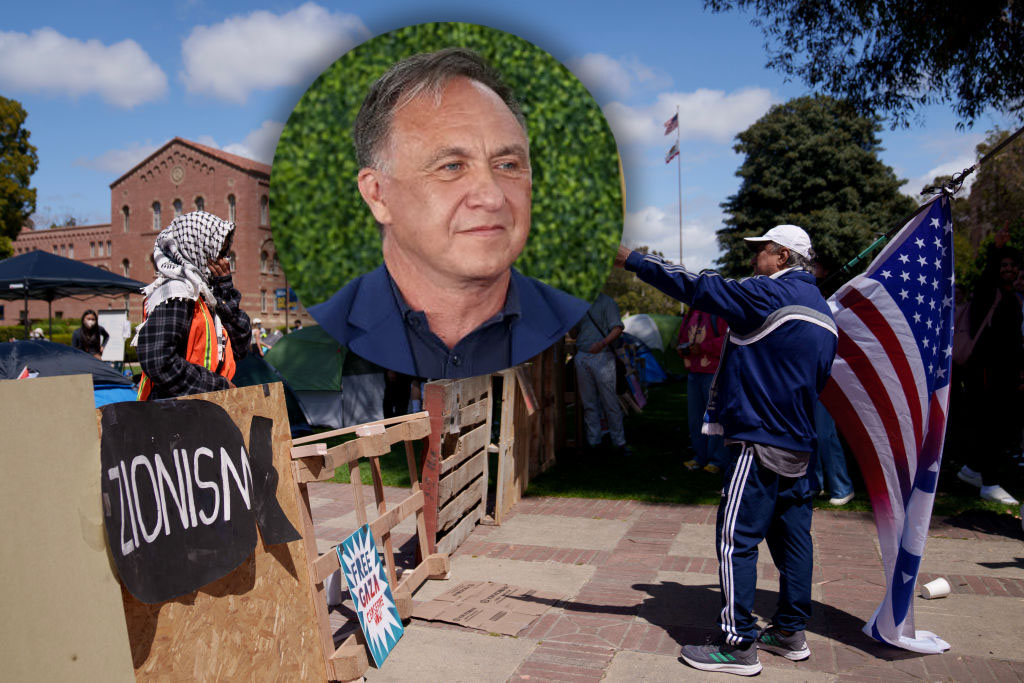













 More news and opinions than at a Shabbat dinner, right in your inbox.
More news and opinions than at a Shabbat dinner, right in your inbox.